虚拟语气-if引导的非真实条件句(精)
if引导的非真实条件句
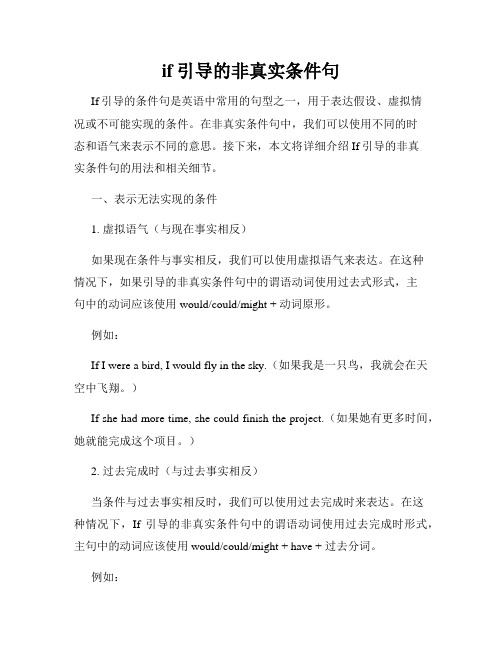
if引导的非真实条件句If引导的条件句是英语中常用的句型之一,用于表达假设、虚拟情况或不可能实现的条件。
在非真实条件句中,我们可以使用不同的时态和语气来表示不同的意思。
接下来,本文将详细介绍If引导的非真实条件句的用法和相关细节。
一、表示无法实现的条件1. 虚拟语气(与现在事实相反)如果现在条件与事实相反,我们可以使用虚拟语气来表达。
在这种情况下,如果引导的非真实条件句中的谓语动词使用过去式形式,主句中的动词应该使用would/could/might + 动词原形。
例如:If I were a bird, I would fly in the sky.(如果我是一只鸟,我就会在天空中飞翔。
)If she had more time, she could finish the project.(如果她有更多时间,她就能完成这个项目。
)2. 过去完成时(与过去事实相反)当条件与过去事实相反时,我们可以使用过去完成时来表达。
在这种情况下,If引导的非真实条件句中的谓语动词使用过去完成时形式,主句中的动词应该使用would/could/might + have + 过去分词。
例如:If I had studied harder, I would have passed the exam.(如果我学得更努力,我就会通过考试。
)If they had arrived earlier, we could have watched the sunset.(如果他们早点到达,我们就可以欣赏到日落。
)二、表示可能实现的条件1. 一般现在时(与现在事实相符)如果条件与现在事实相符,我们可以使用一般现在时来表达。
在这种情况下,If引导的非真实条件句中的谓语动词使用一般现在时形式,主句中的动词通常使用will/shall/can/may/must等情态动词。
例如:If it rains tomorrow, we will stay at home.(如果明天下雨,我们就会呆在家里。
虚拟语气1

If引导的虚拟语气用于非真实条件句
❤与现在事实相反:从句用“动词的过去式(be动词一律用were)”
主句用“would/could/should/might + 动词原形”
如果我有时间,我就会参加你的晚会。
例句:If I had time, I would attend your party.
❤与过去事实相反:从句用“had + 过去分词”
主句用“would/could/should have + 过去分词”
你当时不让我来开车。
如果我们轮流开车,你就不会觉得那么累。
例句:You didn’t let me drive. If we had driven in turn, you wouldn’t have got so tired.
❤与将来事实相反:从句用“动词的过去式;should + 动词原形; were to + 动词原形”
主句用“would/could/might/should + 动词原形”
如果明天下雪,我们就照相。
❤混合虚拟条件句:如果条件从句的动作和主句的动作不是同时发生,主句和从句的谓语动词的形式应分别根据各自所表示的时间加以调整。
If I were as clever as you think, I should have been rich by now.
如果我像你想得那么聪明,现在就会很富有了。
(从句是真实条件句,主句是虚拟语气)
If you had worked hard, you would be very tired now.
如果你真的努力工作了,你现在就会感到很累的。
(从句指过去,主句指现在)。
if非真实条件句
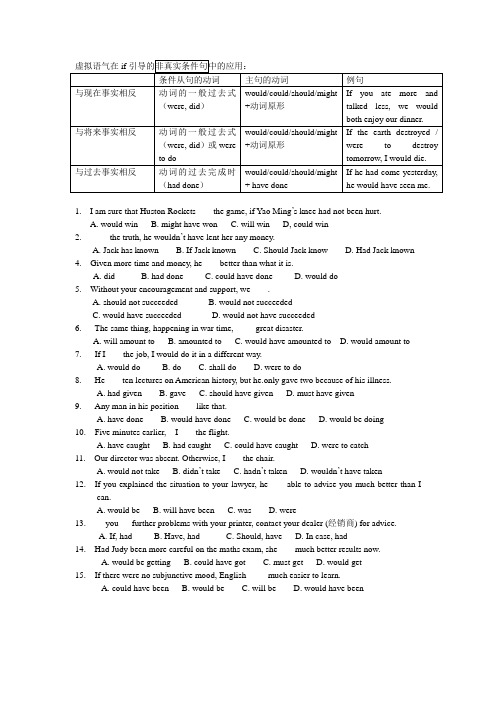
1.I am sure that Huston Rockets ___ the game, if Yao Ming’s knee had not been hurt.A. would winB. might have wonC. will win D, could win2.____ the truth, he wouldn’t have lent her any money.A. Jack has knownB. If Jack knownC. Should Jack knowD. Had Jack known4. Given more time and money, he ___ better than what it is.A. didB. had doneC. could have doneD. would do5. Without your encouragement and support, we ___ .A. should not succeededB. would not succeededC. would have succeededD. would not have succeeded6. The same thing, happening in war time, ____ great disaster.A. will amount toB. amounted toC. would have amounted toD. would amount to7. If I ___ the job, I would do it in a different way.A. would doB. doC. shall doD. were to do8. He ___ ten lectures on American history, but he.only gave two because of his illness.A. had givenB. gaveC. should have givenD. must have given9. Any man in his position ___ like that.A. have doneB. would have doneC. would be doneD. would be doing10. Five minutes earlier, I ___ the flight.A. have caughtB. had caughtC. could have caughtD. were to catch11. Our director was absent. Otherwise, I ___ the chair.A. would not takeB. didn’t takeC. hadn’t takenD. wouldn’t have taken12. If you explained the situation to your lawyer, he ___ able to advise you much better than Ican.A. would beB. will have beenC. wasD. were13. __ you __ further problems with your printer, contact your dealer (经销商) for advice.A. If, hadB. Have, hadC. Should, haveD. In case, had14. Had Judy been more careful on the maths exam, she ___ much better results now.A. would be gettingB. could have gotC. must getD. would get15. If there were no subjunctive mood, English ____ much easier to learn.A. could have beenB. would beC. will beD. would have been。
最新大学英语三级语法知识总结汇总
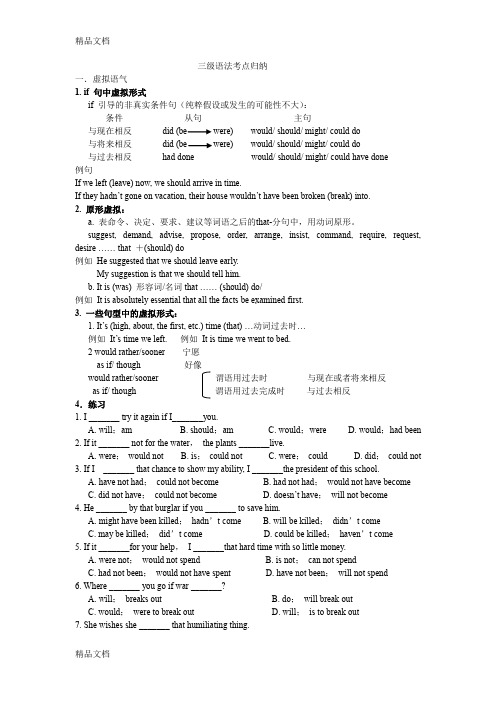
三级语法考点归纳一.虚拟语气1. if 句中虚拟形式if 引导的非真实条件句(纯粹假设或发生的可能性不大):条件从句主句与现在相反did (be were) would/ should/ might/ could do与将来相反did (be were) would/ should/ might/ could do与过去相反had done would/ should/ might/ could have done例句If we left (leave) now, we should arrive in time.If they hadn’t gone on vacation, their house wouldn’t have been broken (break) into.2. 原形虚拟:a. 表命令、决定、要求、建议等词语之后的that-分句中,用动词原形。
suggest, demand, advise, propose, order, arrange, insist, command, require, request, desire …… that +(should) do例如He suggested that we should leave early.My suggestion is that we should tell him.b. It is (was) 形容词/名词that …… (should) do/例如It is absolutely essential that all the facts be examined first.3. 一些句型中的虚拟形式:1. It’s (high, about, the first, etc.) time (that) …动词过去时…例如It’s time we left.例如It is time we went to bed.2 would rather/sooner 宁愿as if/ though 好像would rather/sooner 谓语用过去时与现在或者将来相反as if/ though 谓语用过去完成时与过去相反4.练习1. I _______ try it again if I_______you.A. will;amB. should;amC. would;wereD. would;had been2. If it _______ not for the water,the plants _______live.A. were;would notB. is;could notC. were;couldD. did;could not3. If I _______ that chance to show my ability, I _______the president of this school.A. have not had;could not becomeB. had not had;would not have becomeC. did not have;could not becomeD. doesn’t have;will not become4. He _______ by that burglar if you _______ to save him.A. might have been killed;hadn’t comeB. will be killed;didn’t comeC. may be killed;did’t comeD. could be killed;haven’t come5. If it _______for your help,I _______that hard time with so little money.A. were not;would not spendB. is not;can not spendC. had not been;would not have spentD. have not been;will not spend6. Where _______ you go if war _______?A. will;breaks outB. do;will break outC. would;were to break outD. will;is to break out7. She wishes she _______ that humiliating thing.A. doesn’t doB. didn’t doC. haven’t doneD. hadn’t done8. The chairman suggested that the meeting _______ put off.A. can beB. beC. isD. will be9. It is vital that he _______ immediately.A. should goB. must goC. goesD. went10. It is time we _______do our homework.A. begin toB. can begin toC. began toD. will begin to答案:1.选C。
英语—虚拟语气
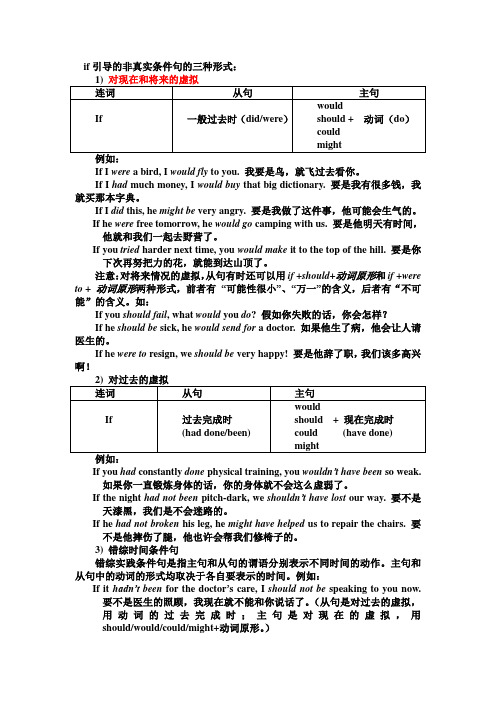
if 引导的非真实条件句的三种形式:If I were a bird, I would fly to you. 我要是鸟,就飞过去看你。
If I had much money, I would buy that big dictionary. 要是我有很多钱,我就买那本字典。
If I did this, he might be very angry. 要是我做了这件事,他可能会生气的。
If he were free tomorrow, he would go camping with us. 要是他明天有时间,他就和我们一起去野营了。
If you tried harder next time, you would make it to the top of the hill. 要是你下次再努把力的花,就能到达山顶了。
注意:对将来情况的虚拟,从句有时还可以用if +should+动词原形和if +were to + 动词原形两种形式,前者有 “可能性很小”、“万一”的含义,后者有“不可能”的含义。
如:If you should fail , what would you do ? 假如你失败的话,你会怎样?If he should be sick, he would send for a doctor. 如果他生了病,他会让人请医生的。
If he were to resign, we should bevery happy! 要是他辞了职,我们该多高兴啊!If you had constantly done physical training, you wouldn ’t have been so weak. 如果你一直锻炼身体的话,你的身体就不会这么虚弱了。
If the night had not been pitch-dark, we shouldn ’t have lost our way. 要不是天漆黑,我们是不会迷路的。
if 条件句虚拟语气
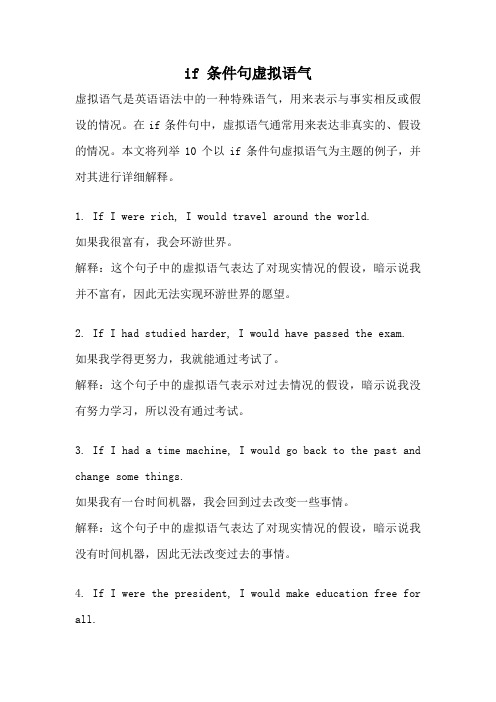
if 条件句虚拟语气虚拟语气是英语语法中的一种特殊语气,用来表示与事实相反或假设的情况。
在if条件句中,虚拟语气通常用来表达非真实的、假设的情况。
本文将列举10个以if条件句虚拟语气为主题的例子,并对其进行详细解释。
1. If I were rich, I would travel around the world.如果我很富有,我会环游世界。
解释:这个句子中的虚拟语气表达了对现实情况的假设,暗示说我并不富有,因此无法实现环游世界的愿望。
2. If I had studied harder, I would have passed the exam.如果我学得更努力,我就能通过考试了。
解释:这个句子中的虚拟语气表示对过去情况的假设,暗示说我没有努力学习,所以没有通过考试。
3. If I had a time machine, I would go back to the past and change some things.如果我有一台时间机器,我会回到过去改变一些事情。
解释:这个句子中的虚拟语气表达了对现实情况的假设,暗示说我没有时间机器,因此无法改变过去的事情。
4. If I were the president, I would make education free for all.如果我是总统,我会让教育对所有人免费。
解释:这个句子中的虚拟语气表达了对现实情况的假设,暗示说我并不是总统,所以无法实现让教育免费的目标。
5. If it didn't rain tomorrow, we could go hiking.如果明天不下雨,我们可以去远足。
解释:这个句子中的虚拟语气表达了对未来情况的假设,暗示说明天可能会下雨,所以无法去远足。
6. If I had known you were coming, I would have prepared a meal for you.如果我知道你要来,我会为你准备一顿饭。
if引导的条件句是什么从句

if引导的条件句是什么从句if 引导的条件句有真实条件句和非真实条件句两种;1、真实条件句:叙述真实可能发生的事情;例句:If you fail in the exam,you will let him down.如果你考试不及格,你会让他失望的。
扩展资料2、非真实条件句:虚拟语气的一种,表示与实际已发生事实相反:例句:If I were you, I would invite him.如果我是你,我会邀请他。
3、另一个常用连词为unless,大多数时候意思与 if not 相近:例句:Let's go out for a walk unless you are too tired.我们出去散步吧,除非你太累了。
例句:If you are not too tired, let's go out for a walk.如果你不太累,我们出去散步吧。
条件状语从句的基本用法1、用if引导:if意为“如果”。
例句:If you cheat in the exam you’ll never get away with it.考试作弊必予追究。
2、用unless引导:unless的意思是“如果不”“除非”。
例句:Unless you go at once you will be late.如果你不马上走,就会迟到的'。
3、用as [so] long as引导:as [so] long as的意思是“如果”“只要”。
例句:I’ll remember that day as long as I live.只要我活着,我就不会忘记那个日子。
4、用in case引导:in case用连词引导条件状语从句时,其意为“如果”“万一”。
例句:In case I forget, please remind me about it.万一我忘记,请提醒我一下。
5、条件状语从句的时态:当主句为将来时态或含有将来意义时,条件状语从句习惯上要用一般现在时表示将来意义,而不能直接使用将来时态。
虚拟语气讲解
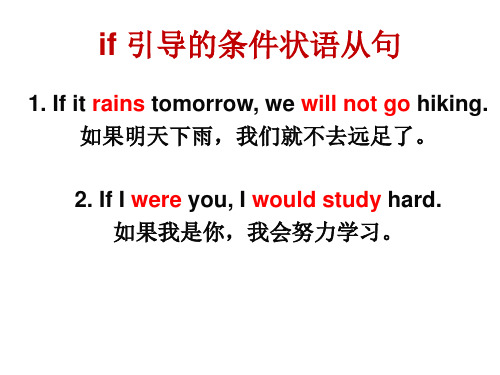
If I had a million dollars now, I would…
如果我有一百万美元,我会为我的家人买一座别墅。 If I had a million dollars now, I would buy a villa(别墅) for my family. 如果我有一百万美元,我会环游世界。 If I had a million dollars now, I would travel around the world. 如果我有一百万美元,我会去购物。 If I had a million dollars now, I would go shopping. 如果我有一百万美元,我会把它捐给慈善机构。 If I had a million dollars now, I would donate it to a charity organizaall match We would have won the match 如果杰克踢进那个球(score that goal), 如果我们还有多几分钟,
如果我们更加刻苦地训练,
如果本(Ben)把球传给了乔(Joe), 如果有成千的球迷为我们尖叫(scream for us), 如果我死死的盯住球(take one’s eyes off sth), 如果我前个晚上不熬夜(stay up late), 如果我们没有掉以轻心(take it easy), 如果我们没有精疲力竭(run out of), 我们本来是会得冠
虚拟(非真实)条件句 主句
与现在 事实相 反的假 设 与过去 相反的 假设
If+主语+动词的过去式 (动词be用were)
主语+should/
If+主语+had +过去分词
虚拟语气用法小结
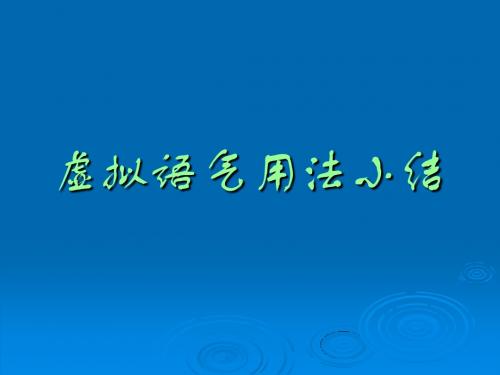
例如:
It is necessary that he be sent to prison at once. It is best that workers have a pleasant place to relax.
3、用于表语从句或同位语从句中。 请注意下列名词:
suggestion, idea, plan, proposal, recommendation, advice, decision, instruction, insistence, preference, necessity, requirement, resolution, motion, desire… 以上名词后出现的表语从句或同位语从句 中,谓语动词采用(should)+ 中,谓语动词采用(should)+ 动词原形构成 虚拟语气。
1、例如:
I suggest that he (should) go at once. In the past man generally preferred that their wives work at home.
2、用于主语从句中
It is desired (suggested, requested, ordered, decided, arranged, recommended…) that… It is strange (necessary, incredible, urgent, possible, essential, advisable, natural, important, preferable, ridiculous, vital, insistent, best, better…) that… It is a pity (shame, must…) that… 上述结构引起的主语从句中谓语动词采用 (should)+ 动词原形构成虚拟语气。
if引导的非真实性条件状语从句即虚拟语气(最新整理)
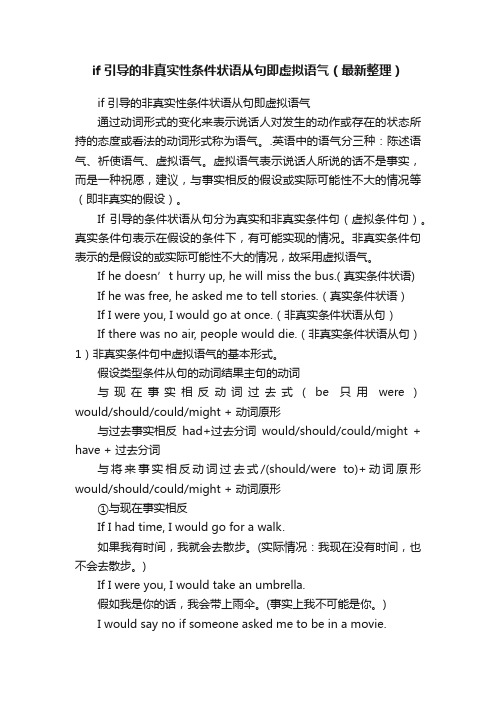
if引导的非真实性条件状语从句即虚拟语气(最新整理)if 引导的非真实性条件状语从句即虚拟语气通过动词形式的变化来表示说话人对发生的动作或存在的状态所持的态度或看法的动词形式称为语气。
.英语中的语气分三种:陈述语气、祈使语气、虚拟语气。
虚拟语气表示说话人所说的话不是事实,而是一种祝愿,建议,与事实相反的假设或实际可能性不大的情况等(即非真实的假设)。
If 引导的条件状语从句分为真实和非真实条件句(虚拟条件句)。
真实条件句表示在假设的条件下,有可能实现的情况。
非真实条件句表示的是假设的或实际可能性不大的情况,故采用虚拟语气。
If he doesn’t hurry up, he will miss the bus.( 真实条件状语)If he was free, he asked me to tell stories.(真实条件状语)If I were you, I would go at once.(非真实条件状语从句)If there was no air, people would die.(非真实条件状语从句)1)非真实条件句中虚拟语气的基本形式。
假设类型条件从句的动词结果主句的动词与现在事实相反动词过去式(be只用were)would/should/could/might + 动词原形与过去事实相反had+过去分词would/should/could/might + have + 过去分词与将来事实相反动词过去式/(should/were to)+动词原形would/should/could/might + 动词原形①与现在事实相反If I had time, I would go for a walk.如果我有时间,我就会去散步。
(实际情况:我现在没有时间,也不会去散步。
)If I were you, I would take an umbrella.假如我是你的话,我会带上雨伞。
(事实上我不可能是你。
精选高中英语语法通用PPT课件:非真实条件句中的虚拟语气 if引导虚拟语气课件(共32张PPT)

与现在事实相反 PLereasde-inntation
虚拟语气表达的并不是事实, 而是一种主观的愿望、假设、 猜测或空想。
back
与现在事实相反 PLereasde-inntation
实际情形 If从句
主句
与 现在 事实 相反时
would 动词的过去式 should not+ do (be → were) could
of money if I have received full marks. A: What would you have done if you had
had a lot of money? …
与过去事实相反
PPrraaccttiiccee2
Watch a film
What does the actor want to express by the words "This car, ten more people. This pin, two more people"?
B: I wish I were with them,too.Let's go to see them. G: All the way to Shanghai? WWee cgooutlod sifcwheool.
dWidenc'tangnoottossecehtohoelm. every day. B: WIf we earweenroettthheerree,.wWeeccoaunldnoctocookofkorfothr ethme.m.
yourself? • you were the headmaster/class
teacher?
The Subjunctive Mood 1
虚拟语气详解_练习精讲
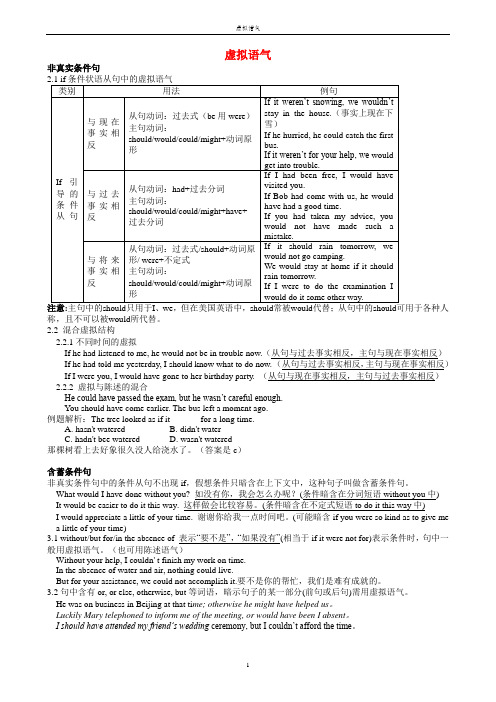
虚拟语气非真实条件句称,且不可以被would所代替。
2.2 混合虚拟结构2.2.1不同时间的虚拟If he had listened to me, he would not be in trouble now.(从句与过去事实相反,主句与现在事实相反)If he had told me yesterday, I should know what to do now. (从句与过去事实相反,主句与现在事实相反)If I were you, I would have gone to her birthday party. (从句与现在事实相反,主句与过去事实相反)2.2.2 虚拟与陈述的混合He could have passed the exam, but he wasn’t careful enough.Y ou should have come earlier. The bus left a moment ago.例题解析:The tree looked as if it ______ for a long time.A. hasn't wateredB. didn't waterC. hadn't bee wateredD. wasn't watered那棵树看上去好象很久没人给浇水了。
(答案是c)含蓄条件句非真实条件句中的条件从句不出现if,假想条件只暗含在上下文中,这种句子叫做含蓄条件句。
What would I have done without you? 如没有你,我会怎么办呢?(条件暗含在分词短语without you中)It would be easier to do it this way. 这样做会比较容易。
(条件暗含在不定式短语to do it this way中)I would appreciate a little of your time. 谢谢你给我一点时间吧。
虚拟语气-if引导的非真实条件句(精)

虚拟语气-if引导的非真实条件句(精)虚拟语气 -if 引导的非真实条件句1. 真是条件句和非真实条件句一般而言, 虚拟语气用于条件状语从句中是考生们最常见、最常考到的虚拟语气语法点。
此种虚拟语气形式也就本课件特定讲解的“ if 引导的非真实条件句之虚拟语气” 。
再讨论此类虚拟语气之前,有必要说明一点:并非所有包含“ if 引导的非真实条件” 从句的句子都是虚拟语气句子。
在英语中, 虚拟语气表示动作或状态与事实相反, 或不可能发生的情况。
因此要判断类似句子是不是虚拟语气, 通常的标准是:假设条件不符合客观事实或者实现的可能性极其微小的, 通常就是虚拟语气;反之则不是。
请理解区别以下句子:(1If you don’ t hurry up, you will miss the bus. 如果他不快点, 他将错过巴士。
( 真实(2If I were you, I would go at once. 如果我是你,我马上就会去。
(非真实, 虚拟语气2. 虚拟语气用于条件状语从句中1 if 假设的条件与现在事实相反或不可能发生。
则条件状语从句用一般过去时(任何be 动词的原来形式一律改用were ,主句用“ would(should, could, might+动词原形” 。
请理解以下句子:(1 If I were you, I would work hard.(2 If we had time, we could play the game again.2 if 假设的条件与过去事实相反或不可能发生。
则条件状语从句用“ had+过去分词主句” ,主句用“ would(should, could, might+have+过去分词” 。
请理解以下句子:(1 If he had taken my advice, he would have passed the exam.(2 If I had known your telephone number, I would have called you.3 if 假设的条件与将来的事实可能相反或不可能发生:条件状语从句:①一般过去时, ② “ should +动词原形” , ③ “ wer e to+动词原形” ; 主句:“ would(should, could, might+动词原形” 。
if引导的非真实条件句的三种类型

"if引导的非真实条件句" 是指在现实情况中,条件句中的情况并不一定能够实现,或者实现的可能性很小。
这种句子通常用来表达与事实相反的情况,或者在虚拟环境中进行假设。
以下是 if 引导的非真实条件句的三种类型:1. 与现在事实相反或不可能发生的情况:这种类型的句子使用了一般现在时和一般过去时,但实际上这两种时态并不矛盾,因为它们只是表达了假设的情况。
例如:If I had enough money, I would buy a car. (如果我有很多钱,我会买车。
)If he were here, he would help us. (如果他在这里,他会帮助我们。
)2. 与过去事实相反或不可能发生的情况:这种类型的句子使用了过去完成时和过去进行时。
例如:If he had known your phone number, he would have called you. (如果他知道你的电话号码,他会打电话给你。
)If they had been here, they would have seen the movie. (如果他们在这里,他们会看到电影。
)3. 与将来事实相反或不可能发生的情况:这种类型的句子使用了过去将来时和过去将来进行时。
例如:If it were to rain tomorrow, we would stay at home. (如果明天下雨,我们会待在家里。
)If they were to come with us, we would plan to go out. (如果他们和我们一起去,我们会计划出去玩。
)。
If 非真实条件虚拟语气句

At last, Jack sacrificed himself to save Rose. Before he died, he might say.
“Rose, if I were to be alive , I would marry you some day.”
docin/sundae_meng
M6U3 Grammar
(If 非真实条件虚拟语气句)
docin/sundae_meng
We will “rock you.”
docin/sun you were a teardrop ; in my eye, For fear of losing you, I would never cry. And if the golden sun, should cease to shine its light, Just one smile from you, would make my whole world bright .
4.If it were not for the expense, I would go
to China.
=Were it not for the expense, I would go to
China.
docin/sundae_meng
Do the exercises on Page 40 and 41.
The ship hit an iceberg and it began to sink. Jack and Rose didn’t get on the life boats.
1.If they _h_a_d_n_’_t _b_e_e_n_(be) on board, they_w__o_u_ld_n_’_t_h_a_v_e__m_e_t_(meet) the disaster.
非真实条件句虚拟语气的三种情况
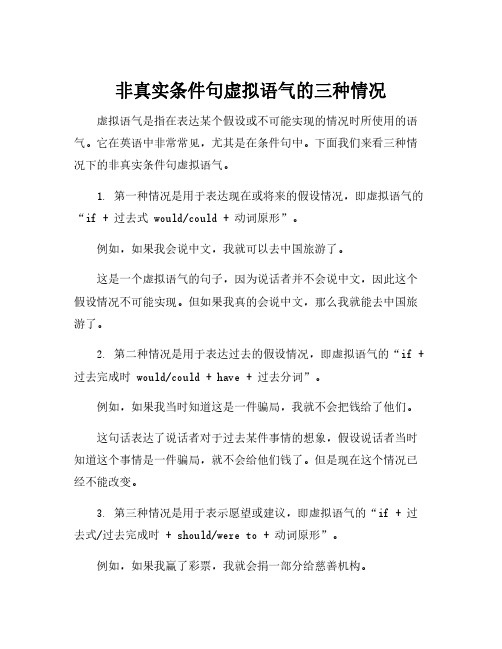
非真实条件句虚拟语气的三种情况虚拟语气是指在表达某个假设或不可能实现的情况时所使用的语气。
它在英语中非常常见,尤其是在条件句中。
下面我们来看三种情况下的非真实条件句虚拟语气。
1.第一种情况是用于表达现在或将来的假设情况,即虚拟语气的“if+过去式would/could+动词原形”。
例如,如果我会说中文,我就可以去中国旅游了。
这是一个虚拟语气的句子,因为说话者并不会说中文,因此这个假设情况不可能实现。
但如果我真的会说中文,那么我就能去中国旅游了。
2.第二种情况是用于表达过去的假设情况,即虚拟语气的“if+过去完成时would/could+have+过去分词”。
例如,如果我当时知道这是一件骗局,我就不会把钱给了他们。
这句话表达了说话者对于过去某件事情的想象,假设说话者当时知道这个事情是一件骗局,就不会给他们钱了。
但是现在这个情况已经不能改变。
3.第三种情况是用于表示愿望或建议,即虚拟语气的“if+过去式/过去完成时+should/were to+动词原形”。
例如,如果我赢了彩票,我就会捐一部分给慈善机构。
这个句子表达了说话者对于未来的愿望,如果真的赢了彩票,就会捐一部分给慈善机构。
但实际上,说话者并没有赢得彩票,这也是一个不可能实现的情况。
总之,虚拟语气在英语中非常常见,能够用来表达各种各样的假设情况,包括现在、将来和过去,还能够用来表示愿望或建议。
熟练运用虚拟语气会让你的英语表达更加生动自然。
if 非真实条件句中的虚拟语气
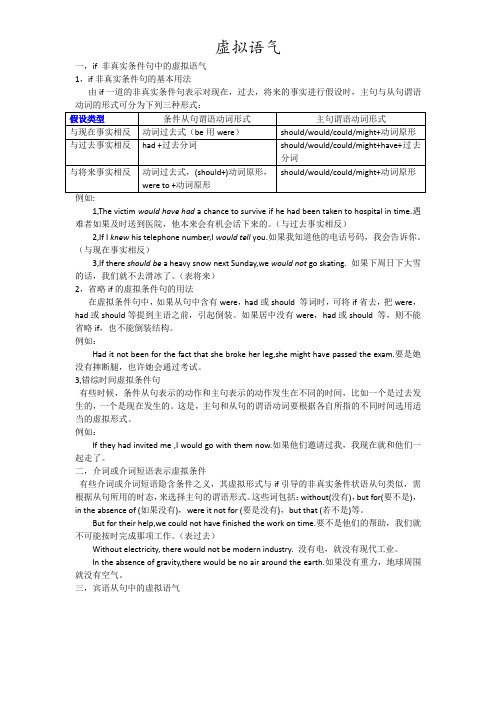
一,if 非真实条件句中的虚拟语气1,if非真实条件句的基本用法由if一道的非真实条件句表示对现在,过去,将来的事实进行假设时,主句与从句谓语动词的形式可分为下列三种形式:1,The victim would have had a chance to survive if he had been taken to hospital in time.遇难者如果及时送到医院,他本来会有机会活下来的。
(与过去事实相反)2,If I knew his telephone number,I would tell you.如果我知道他的电话号码,我会告诉你。
(与现在事实相反)3,If there should be a heavy snow next Sunday,we would not go skating. 如果下周日下大雪的话,我们就不去滑冰了。
(表将来)2,省略if的虚拟条件句的用法在虚拟条件句中,如果从句中含有were,had或should 等词时,可将if省去,把were,had或should等提到主语之前,引起倒装。
如果居中没有were,had或should 等,则不能省略if,也不能倒装结构。
例如:Had it not been for the fact that she broke her leg,she might have passed the exam.要是她没有摔断腿,也许她会通过考试。
3,错综时间虚拟条件句有些时候,条件从句表示的动作和主句表示的动作发生在不同的时间,比如一个是过去发生的,一个是现在发生的。
这是,主句和从句的谓语动词要根据各自所指的不同时间选用适当的虚拟形式。
例如:If they had invited me ,I would go with them now.如果他们邀请过我,我现在就和他们一起走了。
二,介词或介词短语表示虚拟条件有些介词或介词短语隐含条件之义,其虚拟形式与if引导的非真实条件状语从句类似,需根据从句所用的时态,来选择主句的谓语形式。
虚拟语气详解
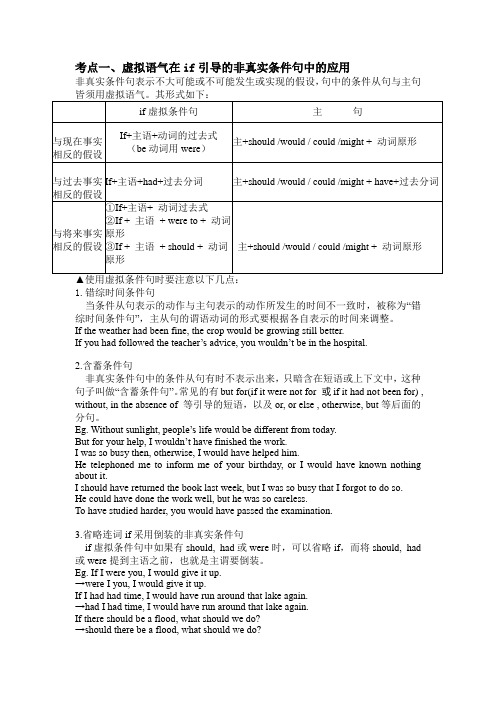
考点一、虚拟语气在if引导的非真实条件句中的应用非真实条件句表示不大可能或不可能发生或实现的假设,句中的条件从句与主句1.错综时间条件句当条件从句表示的动作与主句表示的动作所发生的时间不一致时,被称为“错综时间条件句”,主从句的谓语动词的形式要根据各自表示的时间来调整。
If the weather had been fine, the crop would be growing still better.If you had followed the teacher’s advice, you wouldn’t be in the hospital.2.含蓄条件句非真实条件句中的条件从句有时不表示出来,只暗含在短语或上下文中,这种句子叫做“含蓄条件句”。
常见的有but for(if it were not for 或if it had not been for) , without, in the absence of 等引导的短语,以及or, or else , otherwise, but等后面的分句。
Eg. Without sunlight, people’s life would be different from today.But for your help, I wouldn’t have finished the work.I was so busy then, otherwise, I would have helped him.He telephoned me to inform me of your birthday, or I would have known nothing about it.I should have returned the book last week, but I was so busy that I forgot to do so.He could have done the work well, but he was so careless.To have studied harder, you would have passed the examination.3.省略连词if采用倒装的非真实条件句if虚拟条件句中如果有should, had或were时,可以省略if,而将should, had 或were提到主语之前,也就是主谓要倒装。
虚拟语气精解

虚拟语气精解一.if引导的条件句。
1)先来看为什么我们要用虚拟语气。
为什么IF引导的条件句适合我们使用虚拟语气。
首先我们来看这一句。
如果我现在知道他的电话,我会告诉你的。
(表达的是我现在不知道他的电话,所以不能告诉你)显然在我们不知道虚拟的情况下,我们会用。
If I know his telephone number, I will tell you.(if 引导的状语从句know不能用将来时,只能是现在时,这大家都知道哦)可是我们会发现这句英语表示的是将来的意思。
不是现在。
确切的解释的是:果我知道了他的电话号码,我将告诉你。
明显和你要表达的意思不一样。
那怎么样才能表达我现在不知道他的电话,这层意思那。
这里就要用到虚拟,确切的说就是和现在的事实相反。
下面我们来看这句。
这本书以前是在这里的。
(现在不在这里了)。
This book was here.这样表达大家不难理解吧。
要表达我现在不知道他的电话。
我们就用过去时态,来表示和现在相反。
If I knew his telephone number, I would tell you.就可以了。
尽管knew表示的是过去,但是暗指的是现在我不知道。
所以主句用该用过去将来时态也就是Would.因为过去的将来,也就是指现在。
2)现在我们来看这句。
如果我知道了他的电话,我早就告诉你了。
(暗指过去我不知道,不然早就告诉你了。
过去的事实相反)同理和过去的事实相反,我们只能用过去的过去来暗指。
所以这句话就因该是If I had known his telephone number, I would have told you.Had known 尽管是过去完成时态,但是暗指我过去不知道。
与过去事实相反。
、*************************************************************************虚拟是什么,虚拟就是假的。
- 1、下载文档前请自行甄别文档内容的完整性,平台不提供额外的编辑、内容补充、找答案等附加服务。
- 2、"仅部分预览"的文档,不可在线预览部分如存在完整性等问题,可反馈申请退款(可完整预览的文档不适用该条件!)。
- 3、如文档侵犯您的权益,请联系客服反馈,我们会尽快为您处理(人工客服工作时间:9:00-18:30)。
虚拟语气 -if 引导的非真实条件句
1. 真是条件句和非真实条件句
一般而言, 虚拟语气用于条件状语从句中是考生们最常见、最常考到的虚拟语气语法点。
此种虚拟语气形式也就本课件特定讲解的“ if 引导的非真实条件句之
虚拟语气” 。
再讨论此类虚拟语气之前,有必要说明一点:并非所有包含“ if 引导的非真实条件” 从句的句子都是虚拟语气句子。
在英语中, 虚拟语气表示动作或状态与事实相反, 或不可能发生的情况。
因此要判断类似句子是不是虚拟语气, 通常的标准是:假设条件不符合客观事实或者实现的可能性极其微小的, 通常就是虚拟语气;反之则
不是。
请理解区别以下句子:
(1If you don’ t hurry up, you will miss the bus. 如果他不快点, 他将错过巴士。
( 真实
(2If I were you, I would go at once. 如果我是你,我马上就会去。
(非真实, 虚拟语气
2. 虚拟语气用于条件状语从句中
1 if 假设的条件与现在事实相反或不可能发生。
则条件状语从句用一般过去时(任何 be 动词的原来形式一律改用 were ,主句用“ would(should, could, might+动词原形” 。
请理解以下句子:
(1 If I were you, I would work hard.
(2 If we had time, we could play the game again.
2 if 假设的条件与过去事实相反或不可能发生。
则条件状语从句用“ had+过去分词主句” ,主句用“ would(should, could, might+have+过去分词” 。
请理解以下句子:
(1 If he had taken my advice, he would have passed the exam.
(2 If I had known your telephone number, I would have called you.
3 if 假设的条件与将来的事实可能相反或不可能发生:条件状语从句:①
一般过去时 , ② “ should +动词原形” , ③ “ were to+动词原形” ; 主
句:“ would(should, could, might+动词原形” 。
其中①的情况包括一些在条件状语从
句中用一般时表示将来时的特殊动词和动词词组, 如“ go , arrive , come , leave , start , stay , return, play, do, have, work, wear, spend, see, meet, there be”等,请随带记忆。
请理解以下句子:
(1 If there were rain tomorrow, the game would be put off.
(2 If it were to snow tomorrow, they would not go out.
(3 If it should rain tomorrow, I would stay at home.
P.S 省略 if 的虚拟语气
如果从句中含有 were/ should/ had时, 则可以把这三个词置于句首, 省略 if , 并
在从句中采用倒装语序。
请理解一下句子。
(1 If she were here, she would agree with us. → Were she here, she would agree with us.
(2 If it should happen, what would you do? → Should it happen, what would you do?
(3 If he had recognized me, he would have come over. → Had he recognized me, he would have come over.
3. 总结
以上 3大类情况属于 if 引导的非真实条件句的虚拟语气的常见基本形式, 但其所有形式绝不仅限于此。
如:
If you had followed my advice, you would be better now. 这显然是假设条件与过去相反, 而主句表达现在情况的混合虚拟语气句, 并且没有任何语法错误。
因此需要说明的是,要学好虚拟语气,对句意的理解才是根本。
